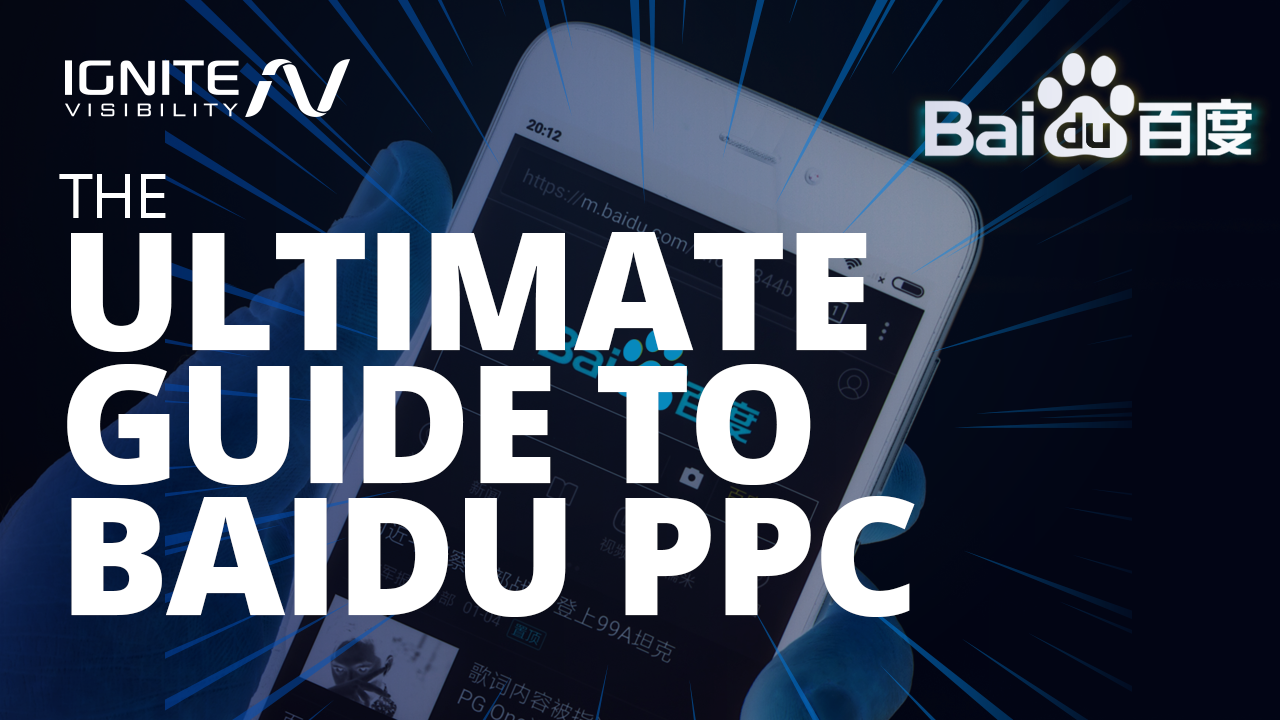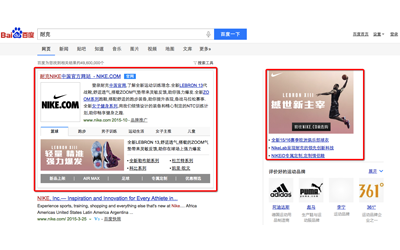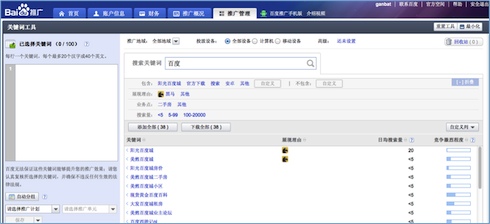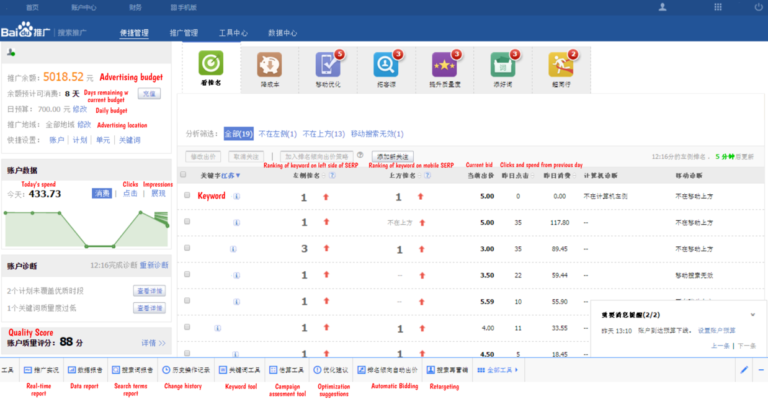Google, Facebook, LinkedIn, Amazon… and Baidu?
Hear me out.
China’s answer to Google Ads presents an entry into the Chinese marketplace and the ability to get your products in front of a massive audience 2 billion deep.
Here, we’ll talk about why you should use Baidu PPC, as well as the metrics and bidding strategies you need to know before getting started.

The Ultimate Guide to Baidu PPC
What You’ll Learn:
- Why you should be seriously considering Baidu PPC
- How to get your site ready for Baidu PPC
- Baidu ad copy guidelines
- Baidu ad types overview
- Baidu campaign settings overview
- Baidu PPC ad targeting options
- Baidu PPC research tools
- Baidu account set-up
- Further considerations
What is Baidu PPC and Why Should You Use it?
We’ve talked about Baidu SEO and the challenges and benefits of getting involved with the Chinese search engine.
Baidu is hands down the biggest search engine in China, with 95% coverage in the country. On the flip side, only 2.3% of searches in China are conducted on Western search engine.
And, as you likely know, China makes up a major part of the world’s population. As in, over 1 billion.
Which means that if your marketing goals include reaching an international audience, optimizing for Baidu is your best option.
Now, if you’re thinking about Baidu SEO, you’ll want to consider getting into their paid ads program to
promote your site, drive conversions, and you know, any reason you might use Google Ads.
Baidu PPC: Get Your Chinese Website Ready
Because Baidu is a Chinese search engine, it only makes sense to direct users to a Chinese websites and landing pages. As is the case with Baidu SEO, Baidu PPC only allows their advertisers to use one, top-level domain.
While it’s not required to run PPC ads, having a Chinese version of your website will likely have a dramatic impact on the success of your campaigns.
The idea is, if you create Chinese ads, but direct your searchers to an English-language landing page, most searchers will click away when they realize they don’t understand the language.
As such, you’ll need a full Chinese version of your website that is in Simplified Mandarin Chinese. Now, the site doesn’t need to be hosted in China, but it does need to accept payments from the usual channels–AliPay, WeChat Pay, and Union Pay.
And of course, businesses need to make sure that their sites open, function properly, and have fast load times in mainland China.
Like Google, Baidu ranks sites based on speed, among other signals. If your site is too slow, it could take longer for Baidu to verify your website. Down the road, this could have a negative impact on your campaign performance.
The other thing to consider is whether your site is appealing to Chinese consumers. It might not be enough to translate the language.
Consider working with an agency that understands what consumers are looking for in a website and how to optimize for conversions.
Chances are, the main reason you’re running PPC is to drive conversions, so you’ll want to make sure you’re driving people to a site that is attractive, user-friendly, and relevant to their search terms.
Baidu also looks for clear information stating what your business does, so pay close attention to your About Us and Contact pages.
If your website doesn’t have a Chinese translation, don’t use a machine-based translation tool like Google
Translate. Instead, I recommend hiring a translator to do this for you to better ensure accuracy.
Baidu PPC Ad Copy Guidelines
In terms of the actual ads, regulations are tight here, too. The platform has several blacklisted terms including the Chinese translations of the following:
- Best, No.1, Top class
- Trustworthy
- Guarantee
- Exclusive
Industries like healthcare, gambling, finance, and other highly regulated spaces have even more regulations in place.
As is the case with Google ads, Baidu limits the number of characters advertisers can include in an ad.
It’s also worth pointing out that official accounts are not allowed to use symbols in their ad copy unless those
brands can prove that they are the rightful owner.
Baidu Ad Types
In the wake of a 2016 scandal, Baidu has reworked their ranking signals, reducing the number of paid ads that can appear atop search results. The incident in question involved a student who died after trying an experimental cancer therapy that he found at the top of his search results.
Today, only four results will appear at the top of desktop search results, whereas the previous version of Baidu set that limit at 11.
There are also two paid results found at the bottom, plus a handful of ads featured in the sidebar column.
Baidu PPC: Brand Zone
Baidu offers something called Brand Zone, a branded search ad format with no Google equivalent.
Baidu Brand Zone is a large format ad triggered by branded search terms.
Brand Zone provides advertisers with a high-impact visual experience. But, given that the ads take over the whole top section of the search results, the price can get pretty high.

Baidu PPC: Brand Zone
Brand Zone ads display company details alongside product shots and links to websites where searchers can make purchases. For brands, this format is a way to ensure more people visit their official website.
Prices vary based on search term, though some sources have stated that the Brand Zone package will run marketers about $1500 a month. To get a quote, you’ll need to talk to a reseller or a Baidu rep.
Additional costs may apply should you decide to customize the format. As a point of reference, the Brand Zone bundle typically includes Baidu Knowledge, Baidu Images, and more.
Baidu Knowledge
Baidu Knowledge is a paid questions and answers offering.
Ads are triggered when searchers type in specific questions and advertisers are charged based on a CPC model. Knowledge ads are displayed on the right side column and when users click, they’ll be redirected to Baidu’s Q&A page.

Baidu PPC: Brand Knowledge. Image courtesy of The Egg.
The benefit of running a knowledge campaign is to demonstrate thought leadership in your industry, which can go a long way when it comes to building trust in a foreign marketplace.
Baidu Landmark
Landmark actually looks quite a bit like Knowledge Marketing ads.
You’ll find landmark ads on the right side of the search results. These ads–characterized by a short line of text and an image or video, are triggered by non-branded search terms.

Baidu PPC: Landmark. Image courtesy of The Egg.
Baidu In-Feed Ads
In-feed ads display under the search box on mobile devices.
These ads are mixed in with organic content and are displayed in Baidu products like the Baidu home page,
mobile app, Baidu news, and other Baidu-owned properties.
Baidu PPC Campaign Settings
Baidu’s campaign settings are pretty straightforward. You can choose between PC or mobile preference, though you can control what percentage of traffic you’d like to target based on each device type.
That said, you may want to pay special attention to mobile campaigns.
We’ve been hearing about mobile’s rise to the top for years in the context of Google. In 2015, the search giant made an announcement that mobile search had surpassed desktop. At the same time, Baidu reported that mobile revenue made up about half of their total earnings.
Industry Target Campaign
One of Baidu’s newest campaign offerings is something known as the Industry Target Campaign.
This campaign doesn’t use keywords to trigger ads; instead, you’ll submit URLs containing content related to your business–products, features, or an about us page, for instance.
Baidu analyzes this information and any time someone submits a query that relates to what your business is offering, your ad will show up in the sponsored results.
The closest Google equivalent is probably Google Shopping ads, as users submit their product catalogs and the algorithm displays ads when searchers are typing in something that matches up with the advertiser’s products.
Industry targeting doesn’t necessarily limit this feature to one type of business like Google Shopping, and we could see this as being a really great way to break out in front of a high-intent audience, whether you’re a B2B brand, business services company, or an e-commerce store.
Baidu PPC Match Types
Those familiar with Google Ads are likely also familiar with the terms Broad Match, Phrase Match, Broad Match Modifier, and Exact Match.
These dictate how – and if – your ads will appear for specific keywords. Baidu PPC also uses match types, but given the complexity of the Chinese language, their match types operate a little differently.
The most noticeable difference? Baidu offers no Broad Match Modifier. It does offer Broad Match and Exact Match, as well as three different types of Phrase Match.
- Phrase Match – Core Phrase: shows ads when someone searches for a query that contains the same central meaning as your keyword phrase
- Phrase Match – Synonym Phrase: appear when someone searches for a synonym of your target phrase
- Phrase Match – Exact Phrase: appear when someone searches for your exact target phrase
Baidu PPC: Budget
Baidu allows users to set budgets on both the account level and the campaign level. This offers some control for marketers, as they can set an account-level budget that covers all campaigns.
However, it’s important to note that all Baidu PPC ads are delivered on an automated basis.
While Google Ads gives its users a choice between manual bidding and automated, Baidu isn’t quite as flexible.
Some advertisers may find this frustrating, as automated bidding requires giving up some control. Often, this causes advertisers to use up their budget early on, and ultimately their ads stop showing as a result.
The biggest challenge here is that marketers don’t have the ability to learn more about the best times to display their ads.
Baidu PPC: Ad Targeting
Baidu allows brands to target based on location, device, or interest.
Interest-Based Targeting
What’s nice about interest-based targeting is it allows marketers the opportunity to target searchers based on behaviors, as well as specific industry interests such as consulting or manufacturing.
The idea is similar to what you’d see with Facebook’s Audience Insights or Google’s Audience Reports.
Locations and Language Targeting
As you might imagine, Baidu PPC campaigns are limited to targeting in Chinese-speaking areas only.
Marketers can target Hong Kong, Mainland China, Taiwan, Macau, as well as a handful of other nearby
countries.
Baidu PPC and Research Tools
Like Google, Baidu’s advertising platform comes with some tools designed to help you set up and monitor your ad performance.
Here’s a look at some of the tools you can expect to find inside the platform:
Baidu Keyword Planner
As with Google, the Keyword Planner shows you the search volumes associated with each keyword term, as well as the expected cost-per-click.
Keyword research may be challenging for brands without much knowledge of the Chinese language, as well as their target audience.
As such, keyword research, as well as other areas like structuring your ad copy may require some help from an outside agency for best results.

Baidu PPC: Keyword research
Baidu PPC Analytics
Baidu’s analytics platform, Baidu Tongji can connect to your Chinese website. This allows you to track incoming traffic, visitor behavior, and see where users are coming from.
While Tongji is similar to Google Analytics, it doesn’t come with as many features built into the platform. That said, it’s still a powerful reporting tool that allows you to learn more about the advertisements that drive the most traffic, conversions, and best ROI.

Baidu PPC: Account overview. Image courtesy of Baidu Advertising.
Baidu Zhishu
Baidu Zhishu is an index that provides behavioral insights, trends, and keyword performance. According to Baidu, the goal of Zhishu is to make everyone a data scientist.
Here, you’ll find a lot of valuable information, including things like what your audience likes on social media, what keywords they use to find products and more.
This tool also includes demand and requirement maps, which use sentiment analysis to uncover individuals’ underlying motives when searching for products or information.
It’s a bit difficult to understand the site’s translation, but the idea here is to present advertisers with a more intuitive idea of what drives their audience.
Baidu Search Term Report Tool
Paid ads account also come with a Baidu Search Term reporting tool which generates a search term report that covers the past 30 days of keyword data.
This tool is useful in the sense that it can help you understand how people search for the keywords you’ve included in your campaigns. Use the report to identify low-value keywords, find negative keyword
opportunities, and see which terms are your most profitable.
Baidu Account Set-up
Baidu only works with Chinese clients, so the reality is you won’t be able to get far on your own without a third-party’s assistance.
That said, the search giant has several authorized resellers and departments set up for handling PPC clients.
To get started, you’ll need to get in touch with one of the local offices or have a Baidu PPC agency do this on your behalf. Going the agency route may be your best bet if you don’t speak Chinese.
While the bidding process is relatively straightforward, we do need to mention the fact that becoming a Baidu advertiser requires way more documentation than becoming a certified Local Services provider on Google.
Unlike Google, Baidu PPC requires a one-time start-up fee of what amounts to approximately $1,000. Part of this goes towards ad credits, while the rest is a designated service fee.
For US brands looking to get started, you’ll have a couple of options. One, you can work directly with major Baidu branches in Shanghai or Beijing. Or two, you can work with an agency partner.
In either case, you’ll need to produce several documents and have them translated into Chinese. The idea here is to prove to the search engine that your company is the real deal, physical location and all.
Here’s a quick rundown on what you’ll need to provide before you can activate your account.
- Business license
- Latest bank statement
- Authorization letter
- Website screenshot
- Photos of your office building
Because this process is complex, highly regulated, and ever-changing, many companies opt for the ease of working with a Baidu agency that can help ensure all paperwork is submitted according to the rules.
How Long Does Baidu PPC Take for Approval?
After you’ve submitted your paperwork, gotten your Chinese website ready, and connected with a reseller, it may take between two and four weeks for Baidu to review your account. The review process is quite involved, as you can see based on the amount of documentation required to get set up.
Some experts have recommended that you check in with your rep frequently to ensure everything is moving along as planned.
We should also mention that there may be some back and forth with the reseller. They may have questions about one of your documents or ask for any items that may have been missing in the initial submission.
While it may seem time-consuming, expect some revisions during this process.
Further Considerations: Protecting Your Brand is a Big Deal on Baidu
Protecting any trademarks or proprietary content is more important on Baidu than on other search engines, as Chinese customers place more value on brand recognition, preferring to purchase from brands they know and trust.
Because counterfeiting runs rampant in China, those brands that can prove they’re the real deal have a leg up when it comes to building trust with their audience.
Baidu knows this, and as a result, offers several levels of brand protection at an extra cost. At the highest level, your competitors won’t be able to bid on your competitive keywords, a strategy Google advertisers can use to outbid the competition.
If your brand already has some recognition in China, it might be worth looking into Baidu’s brand search products to ensure that only you own the search results that come up when someone searches for your brand.
If the Chinese market has yet to learn about your brand, you’ll have some time to decide whether the extra expense is worth your while.
Wrapping Up Baidu PPC
Look, there’s no way around it: getting into the Chinese market in 2019 is not without its challenges.
While they may seem daunting at first, working with an agency might be a smart way to ensure compliance with a sometimes confusing set of rules that change fairly regularly.
Despite all of the hoops you’ll need to jump through to advertise on Baidu, this is one of the best places to advertise in China, proving the extra effort is bound to pay off.
And on the plus side, all of these rules aim to make Baidu a better, more transparent experience for searchers and brands alike.